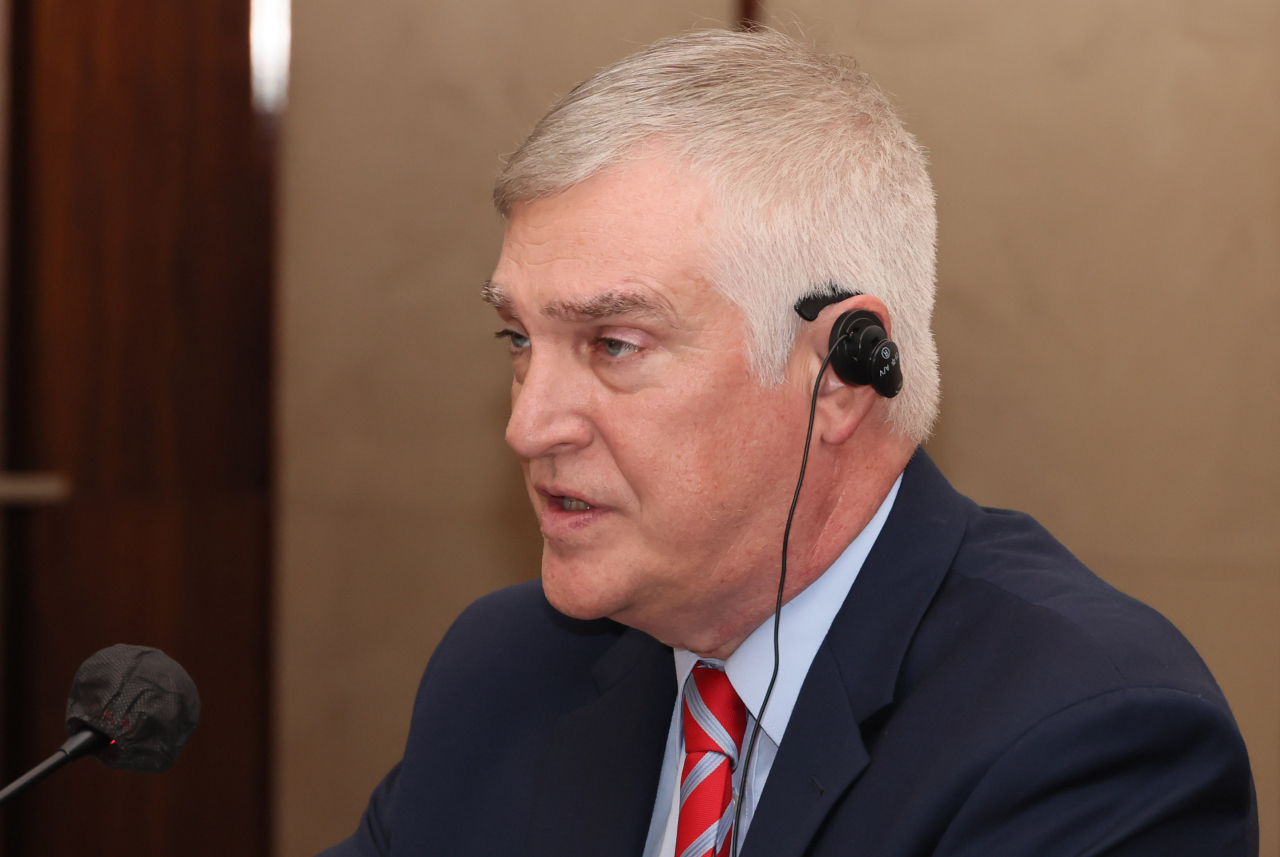 |
Fred Fleitz, vice chair of the America First Policy Institute, speaks during a media roundtable at a hotel in central Seoul on Tuesday. (Yonhap) |
The growing alignment between Russia and North Korea will end when the war in Ukraine is over, and bringing the conflict to a stop will be a priority if ex-U.S. President Donald Trump returns to the White House, a former U.S. official said Tuesday.
Fred Fleitz, a former chief of staff of the National Security Council under the previous Trump administration, also said it will be a "bad precedent" for South Korea if it were to acquire its own nuclear weapons.
"This relationship shows the desperation of the Russians, that Putin had to go to Kim and ask for ammunition to fight the war in Ukraine. That's because no other nation would give him this ammunition," Fleitz, vice chair of the America First Policy Institute, said in a media roundtable in Seoul.
"I believe that when the war in Ukraine ends, this relationship could end too ... It's essential to end this relationship and to end the war, and I believe that would be a priority for President Trump," Fleitz said.
Fleitz was visiting Seoul this week for meetings with experts from think tanks, government officials and businesspeople, including those from the foreign ministry and major companies like Samsung and Hyundai.
His trip draws attention as South Korea and Japan, the United States' Asian allies, are seen as stepping up to grasp Trump's foreign policy plans if he wins a second term in the White House, following U.S. President Joe Biden's poor performance at a recent presidential debate.
Stressing that he is not speaking on behalf of Trump, Fleitz said that Trump, if reelected, will value the alliances and strong relationships the U.S. has with its close allies like South Korea.
In this vein, Fleitz disagreed with the idea of South Korea turning to the option of going nuclear.
The issue has again come into the spotlight here since Russia and the North signed a new treaty pledging mutual military assistance in case either of them is attacked.
"It would be a bad precedent for the principle of nonproliferation," he said.
"A better option would be to strengthen the nuclear umbrella and to reassure South Korea that it will always be there. It's there to stay," Fleitz said.
On the 28,500-strong U.S. troops stationed in South Korea, he saw little possibility that they will be reduced or pulled out of the South even under a second Trump term, because they exist to protect the South from North Korean threats, not China.
"I don't know why some American experts seem to think that they are there to deter China. I think that's wrong. Trump is going to recognize that the American troop presence in South Korea is an important deterrence against North Korea," Fleitz said.
He expected that Trump will try to resume "personal diplomacy" with North Korean leader Kim Jong-un, but there will be a focus on pressuring Kim to act on the promise he made during the 2018 Singapore summit that the North will denuclearize.
Fleitz said he would advise Trump to require Pyongyang to "stop sending weapons to Russia" as a precondition for dialogue.
Fleitz criticized the Joe Biden administration for its lack of policy input on North Korea issues.
"The U.S. has had a 'part-time' envoy for North Korea, who was also ambassador to Indonesia. This man resigned and has not been replaced," he said, apparently referring to Sung Kim, Biden's previous nuclear envoy for the North.
"America has to have a serious policy towards regional security threats, especially with threats of North Korea," Fleitz said. "That means high level engagement by U.S. officials and close cooperation with our allies on how to deal with this threat." (Yonhap)



![[Herald Interview] 'Trump will use tariffs as first line of defense for American manufacturing'](http://res.heraldm.com/phpwas/restmb_idxmake.php?idx=644&simg=/content/image/2024/11/26/20241126050017_0.jpg)

![[Health and care] Getting cancer young: Why cancer isn’t just an older person’s battle](http://res.heraldm.com/phpwas/restmb_idxmake.php?idx=644&simg=/content/image/2024/11/26/20241126050043_0.jpg)

